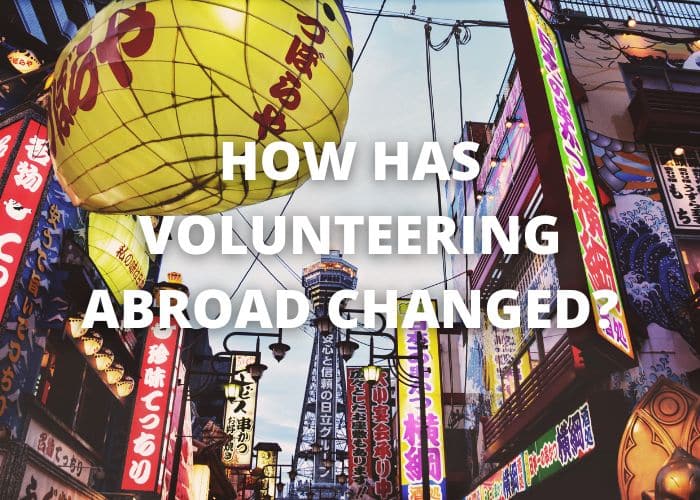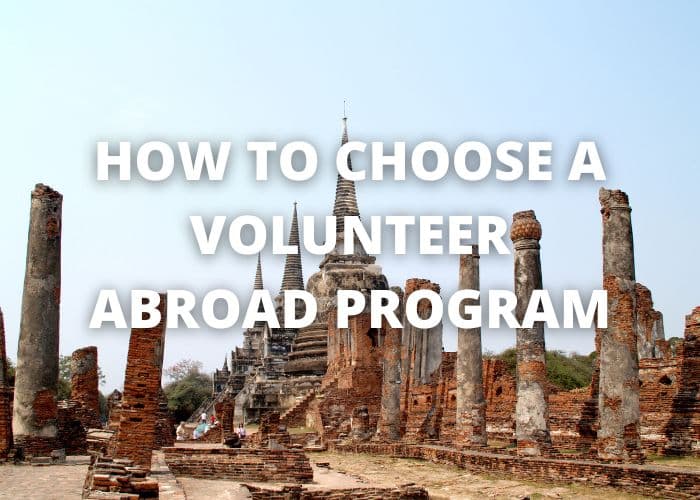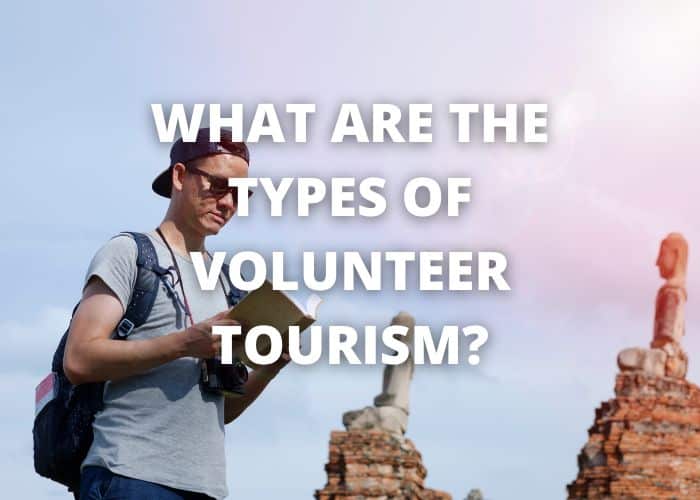Volunteer Abroad
How Has Volunteering Abroad Changed?
Challenges of volunteering abroad Ways to find opportunities to volunteer abroad Benefits of volunteering abroad
Volunteering abroad has many benefits, not the least of which is the ability to see the world from a different perspective. The opportunity to help a foreign country in need broadens a person’s perspective, encourages intellectual growth, and opens their eyes to the world. After all, there are over six billion people on the planet!

A recent pandemic has reinforced the need for local volunteers, particularly in developing countries. This has made it even more important to recruit local volunteers for international development projects. Voluntary Service Overseas, an organization based in the United Kingdom that places skilled volunteers in long-term projects in 30 countries, has sent home fifty of its international volunteers and instead relied on local volunteers to teach primary and public school students.
Many infrastructure organisations have reported that the pandemic has affected their volunteer supply. The disease has reduced the number of pre-existing volunteers, and organisations that were working with volunteers with prior experience have become less interested in bringing in new volunteers. Many VIOs are now turning their work toward digital engagement, but others have not been able to continue to offer volunteer opportunities. Some respondents said that the pandemic has affected their willingness to volunteer and the availability of volunteers, while others said the impact of the disease on their organisation’s capacity has been minimal.
The pandemic has severely affected pre-existing volunteering programs and has caused significant declines in volunteer numbers. Volunteering capacity across all sectors and sizes has suffered. The pandemic has reduced volunteer numbers in almost every organisation, with many organisations reporting drastic reductions in numbers. The problem has also caused volunteers to become increasingly isolated, which can lead to poor mental health.
The COVID pandemic has devastated the travel industry, and the global volunteer industry has been hit hard. The disease has impacted non-governmental organisations and volunteer tourism businesses. It has also led to the closing of some projects and forced some of them to change their services. As a result, some organisations have had to take drastic measures to continue their work.
The pandemic has also changed the face of international volunteering. According to a recent survey by the International Forum for Volunteering in Development (IFVID), the outbreak has caused several volunteer organisations to reconsider their business models and offer new, remote volunteer opportunities. Some groups have also expanded their national volunteer membership to cope with the crisis. Despite these changes, some volunteer groups have returned to their old ways of working, while others are gearing up for a comeback.
Challenges of volunteering abroad
Volunteering in a foreign country can be a rewarding experience, but there are many challenges to overcome. Some of these challenges are cultural, including language barriers. If you don’t speak the local language, you won’t be able to communicate with locals or understand events, such as meetings. You can overcome this by learning the local language before you go, and by carrying a phrasebook or dictionary. You should also consider taking language classes once you arrive in the country.
Another challenge is adapting to a new culture. If you don’t speak the language, you may experience culture shock. To counteract this effect, try to be as open-minded and accepting as possible. You may also get homesick. If this happens, it is best to connect with friends and family back home. You can also get in touch with other volunteers from your country.
Some organizations charge high fees. Many volunteers question whether they are being properly compensated for their work. Others complain that their host families don’t receive a fair amount of money for their work. While these problems are rare, they can happen. If you encounter problems, it is important to share your concerns with the organization in a personal or email. In addition, it is important to keep in mind that the fees for volunteer abroad programs can range anywhere from hundreds to thousands of dollars.
While volunteering abroad can be rewarding, it is important to consider the challenges involved. Volunteering in a developing nation often involves working with locals who lack basic necessities and local infrastructure. In addition, these countries may lack government resources to adequately support high-need projects. Volunteering in developing nations can help you make a difference in your own life and the lives of others.
Some projects require highly skilled volunteers. If you’re planning a medical trip, you may want to consider the country’s requirements before deciding on a project. However, you should always keep the welfare of the patients in mind when choosing a project.
Ways to find opportunities to volunteer abroad
There are a variety of ways to find opportunities to volunteer abroad. One way is by using websites like VolunteerMatch or One Brick. These websites highlight upcoming opportunities with nonprofits. You can also contact groups directly to inquire about their opportunities. This can help you get a feel for the kind of work they need done.
Another way to find volunteer opportunities abroad is by speaking with local organizations. Many of them have local teams that will help you get settled and get started. Some will arrange airport pick-up and provide orientation. Some organizations have 24-hour staff to help with any questions you might have. The more specialized an organization is, the more likely it is that they will provide assistance.
When researching different organizations, read reviews carefully. It’s impossible to find only positive reviews about an organization, so make sure to read both good and bad ones. It’s also important to pay attention to how an organization responds to negative reviews. This will give you a better idea of the organization’s professionalism and attitude towards its volunteers.
Volunteering abroad is a great way to make a positive impact. Search engines can be useful when looking for free opportunities. One of the best resources is GoOverSeas. This site is a treasure trove of volunteer abroad opportunities. It’s also possible to find volunteer opportunities through Facebook or LinkedIn. These social media sites are populated with people who have gone abroad to give their time.
Another excellent way to find volunteer opportunities abroad is through your university. Most universities have a vetting process that ensures the quality of their volunteer programs. This can make volunteering abroad a very affordable way to experience a new culture. Don’t forget to research the organization carefully, though. You should look for reviews and information about previous volunteers. You should also evaluate the fees charged by the organization.
Many organizations have volunteer programs all over the world. Some of the most popular destinations are South Africa, Costa Rica, Thailand, and Zimbabwe. You can volunteer in various areas, including helping to protect wildlife, teaching English, and working with children.
Benefits of volunteering abroad
The benefits of volunteering abroad extend far beyond the immediate impact to the host community. A good volunteer program encourages a total immersion in local culture, including staying with a local host family. This allows volunteers to learn about the lifestyle of the community they are helping, and observe the people’s customs and ways of life. While volunteering abroad, remember to do your research and find an organization with strong local ties that will allow you to make a positive impact on the host community.
Volunteering abroad provides many benefits to the individual volunteer. It provides a unique insight into the lifestyle of a new culture, as well as a chance to learn another language. In addition to learning the local language, volunteers have an opportunity to interact with local people and observe local customs, holidays, and celebrations. Volunteers also enjoy the opportunity to travel and explore their surroundings during free time.
Volunteers who have international experience are likely to be placed in management or supervisory positions at the organization they work for. Volunteer work abroad programs tend to be small, so successful volunteers will be promoted quickly. Since they are highly motivated, the organization will likely see them as an asset to the organization. This can lead to a positive impact on future job prospects.
Volunteering abroad is a great way to give back to a community that needs you. Many international organizations run volunteer programs around the world. It’s important to find one that fits your interests. There are several reputable international organizations that offer a variety of options. Choose a country where you want to serve and contact the organization for more information.
Volunteering abroad helps you develop new relationships and make new friends. You’ll be able to work together for a common cause and help resolve crisis situations. Furthermore, it helps you create a work-life balance by giving you time to travel, recover, and recharge. Volunteering abroad is a great way to improve your quality of life and improve your health.
Another benefit of volunteering abroad is that it will help you to boost your CV. Many volunteer organizations provide training on the job, which can help you learn valuable skills. Some volunteer programs provide training in the areas of teaching, health, conservation, and more.
Volunteer Abroad
Volunteer in Siem Reap Cambodia
Cultural immersion Make a difference Personal growth Build meaningful relationships Affordable living Unique travel opportunities Opportunities to teach English Community development projects Wildlife conservation Meaningful experiences
Volunteering is an incredibly rewarding experience that can benefit both the volunteer and the community they are serving. Siem Reap, a city located in the northwestern region of Cambodia, is a popular destination for volunteers due to its rich culture and numerous opportunities to give back.
The best volunteer program in Siem Reap Cambodia is with Beyond Volunteer where they have several wonderful volunteering projects available. Click here for more info.
In this article, we will discuss why you should consider volunteering in Siem Reap, Cambodia.

- Cultural immersion
One of the biggest benefits of volunteering in Siem Reap is the opportunity to immerse yourself in the local culture. Siem Reap is home to the famous Angkor Wat temple complex, which attracts millions of tourists each year. However, there is so much more to this city than just its famous temples. By volunteering in Siem Reap, you will have the opportunity to interact with locals, learn about their traditions, and gain a deeper understanding of the Khmer culture.
- Make a difference
Volunteering in Siem Reap is a great way to make a tangible difference in the lives of those who live there. There are numerous volunteer opportunities available in the city, ranging from teaching English to working in community development projects. By volunteering, you can help improve the lives of local Cambodians and contribute to the development of the community.
- Personal growth
Volunteering in Siem Reap can be a life-changing experience that can lead to personal growth and development. It provides an opportunity to step outside of your comfort zone, challenge yourself, and learn new skills. You may also gain a new perspective on life, learn to appreciate the little things, and develop a greater sense of empathy.
- Build meaningful relationships
Volunteering in Siem Reap can also help you build meaningful relationships with locals and other volunteers. By working together towards a common goal, you can develop strong bonds with people from all walks of life. This can be especially beneficial for those who are traveling alone and looking to connect with others.
- Affordable living
Siem Reap is an affordable place to live, making it an ideal destination for volunteers who may be on a tight budget. Accommodation and food are relatively cheap, and there are many affordable options available for transportation. This makes it easier for volunteers to focus on their work and contribute to the community without worrying about finances.
- Unique travel opportunities
Siem Reap is also a great destination for those who love to travel and explore new places. The city is located near many other popular destinations in Southeast Asia, such as Thailand, Vietnam, and Laos. Volunteers can take advantage of their time in Siem Reap to explore these nearby countries and gain a deeper understanding of the region.
- Opportunities to teach English
One of the most popular volunteer opportunities in Siem Reap is teaching English. Many local schools and community centers offer English classes to children and adults, and volunteers can help by providing additional support and teaching resources. By teaching English, volunteers can help improve the prospects of local Cambodians by giving them access to better job opportunities and higher education.
- Community development projects
Siem Reap has a number of community development projects that focus on providing basic needs such as clean water, sanitation, and healthcare to the local population. Volunteers can help by working on these projects, either by fundraising or by physically assisting with the construction or implementation of these projects. By doing so, volunteers can make a significant impact on the lives of those who live in Siem Reap.
- Wildlife conservation
Siem Reap is also home to a number of wildlife conservation projects. These projects focus on protecting endangered species such as elephants, tigers, and primates. Volunteers can help by assisting with research, caring for animals, and educating the local community on the importance of wildlife conservation.
- Meaningful experiences
Volunteering in Siem Reap can provide some of the most meaningful experiences of your life. By contributing to the community, you can make a lasting impact on the lives of those who live there. The relationships you build and the memories you create will stay with you long after you return home. Volunteering in Siem Reap is an opportunity to give back, learn, and grow, all while experiencing a new culture and way of life.
In conclusion, volunteering in Siem Reap, Cambodia, can be an incredibly rewarding experience that provides numerous benefits. From cultural immersion to personal growth, volunteering in this city can help you make a difference in the lives of others while also benefiting yourself. If you are considering volunteering abroad, Siem Reap should definitely be on your list of destinations to consider.
Volunteer Abroad
How To Choose A Volunteer Abroad Program
Prerequisites for volunteering abroad Costs of volunteering abroad Project types Budget-friendly projects Identifying a project that aligns with your personal values
If you’re planning to volunteer abroad, you should consider several factors before choosing a volunteer program. First, decide how long you want to stay. Some organizations specialize in long-term placements, while others offer short-term programs. This will help you narrow down your search. Additionally, consider the amount of money you want to spend.

Prerequisites for volunteering abroad
Some projects require specific skills and qualifications. Some require experience, while others just need enthusiastic people willing to serve the cause. Some projects require a good command of English. It may be useful to have previous work experience, or a background in medicine. If you are unsure of your eligibility, you can always contact the organisation and find out if it accepts volunteers with specific requirements.
Some students decide to volunteer abroad because they are unhappy in their current situation. But this is not the best reason to go abroad. Whatever your motivation, the problems at home will not disappear just because you volunteer abroad. They will probably follow you. While cross-border travel can lead to self-improvement, the best way to be happy abroad is to approach the experience with confidence and self-awareness.
One of the most important pre-requisites for volunteering abroad is having an open mind. Volunteering abroad is about gaining new perspectives and traditions, and sharing your skills. While your expectations for the experience may differ from the ones set forth by the organization, the open-minded and compassionate attitude are essential to the success of your trip.
If you have the inclination to help those in need, volunteering abroad is a rewarding experience. It enables you to share your expertise and knowledge, and it could even lead to a career. You can choose to participate in programs that last from two weeks to two years. They may be based in urban or rural settings, or in developing nations. But no matter the location, volunteer abroad programs are an excellent way to gain life experience, gain new friends, and make a difference in the world.
Some volunteer programs require a certain skill or qualification to get started. While this is not a necessity, it does make volunteer work easier if you have a skill that complements the work you’ll be doing. For example, if you’ve always wanted to work with kids, then volunteering in an education program will let you practice your skills and help you develop your love of teaching.
Costs of volunteering abroad
When planning a volunteer trip abroad, it’s important to understand the costs involved. Volunteer fees can range from a few hundred dollars to a few thousand. The amount that you’ll need depends on the type of program you choose and the amount of money that will need to be exchanged. You may also have to pay for personal items, such as toiletries. It is a good idea to create a budget before you begin looking for a program.
While it can be costly to volunteer abroad, it’s possible to cut costs by focusing on an area close to home. For example, if you’re an American, volunteering in Latin America is a great option. Not only can you save hundreds or even thousands of dollars on airfare, but you’ll also be volunteering in an area that has a low cost of living.
Volunteering in South Africa costs about $1,010 per week on average. There are many nonprofit organizations to choose from in South Africa, including Projects Abroad, which has many different types of volunteer opportunities. Some of these include farming and human rights projects. There’s even a program dedicated to saving baby sea turtles, which costs a little more than $1,020 per week.
Volunteering abroad often requires training. Both new and experienced volunteers must familiarize themselves with the local language and culture as well as understand the day-to-day operations of a volunteer program. This training can take a significant amount of time and money. However, the training is worth it because you’ll gain a greater appreciation for your time and effort.
If you choose to volunteer abroad, be sure to choose a nonprofit that has a proven track record. These organizations are known for providing immediate aid to communities in need, and ensure that the good work continues long after you finish the program. Also, make sure that you choose a nonprofit that has systems in place to ensure the skills and background of volunteer workers.
Project types
Identifying your personal goals and the goals of the organization you want to volunteer with are vital parts of choosing the right volunteer abroad program. Generally, most people looking for volunteer abroad programs have similar goals – they are looking to help others in a positive way and have an adventure. In some cases, they are looking to improve their language skills or personal skills. Others are looking to improve their travel skills.
It is also important to consider the culture of the country you are volunteering in. Volunteers who are not accustomed to the culture can be subject to culture shock. You should do your research on the culture, language, and education system of the country where you are volunteering. By doing this, you can make sure that your experience will be both meaningful and memorable.
Once you’ve narrowed down the countries you want to visit, you can start choosing a program that offers opportunities in that region. There are plenty of volunteer organizations in the world, but it’s vital to find one that fits your ideal needs. Before you make a final decision on a destination, consider the language spoken in that country, and whether you want a rural or an urban environment.
There are many different types of international volunteer programs, ranging from a week to three years. Most have a set duration for volunteers, while others let volunteers decide their own dates. The shorter term (1 to three weeks) opportunities usually involve a specific project, while the longer term (3 to 10 months) programs are more about living and working with locals.
Budget-friendly projects
If you are interested in volunteering abroad but don’t want to break the bank, there are several options available. You can choose from short-term, medium-term, and long-term projects. Some programs only cover food and accommodation, while others offer full supervision. Regardless of whether or not you have previous experience working with children or animals, these projects are an excellent way to give back while still having an affordable experience.
Before selecting a volunteer abroad program, you’ll want to carefully research the projects available. You’ll want to decide which type of activity you’d prefer, and you’ll need to factor in the costs associated with airfare. Depending on your destination, airfare can cost as much as the actual program placement. Many volunteer organizations don’t include airfare in their fees, so it’s important to check on the cost before you commit to one.
If you’re on a budget, consider volunteering in a country where you’ll be able to support the local economy. There are plenty of opportunities in developing countries. Depending on your interests and skills, you might be able to help build schools, clean roads, and help out with a variety of projects.
If you’re on a tight budget, look for programs that are local and run by smaller organizations. These programs often don’t have the same administrative structure as a large international organization, and they may not provide a full package. However, these programs may still be an excellent choice if you’re concerned about your financial situation.
Some programs will provide housing for volunteers. These will vary in size, but usually range from a small hut to a standard house or cabin. Volunteers will share rooms with other volunteers, although it’s possible to obtain private rooms for a small fee. This option is usually only available in the slower seasons.
Identifying a project that aligns with your personal values
One of the most important things to look for when looking for a volunteer abroad project is whether the organisation you are applying to meets your personal values and goals. The majority of people looking for an international volunteer program have similar goals: they want to make a difference, enjoy adventure, and be a part of something bigger than themselves. They may also have academic and personal goals in mind, such as pursuing a degree abroad or becoming more independent. Some people even want to focus on improving their travel skills while they are abroad.
There are countless organisations offering volunteer abroad opportunities, but selecting the right one can be a challenge. Finding the right one will ensure that you have a positive impact that will be sustainable. Make sure you read testimonials and stories from previous volunteers and do some research on the organisation you choose.
Volunteer Abroad
What Are the Types of Volunteer Tourism?
There are various types of volunteer tourism. These include Sports, Health, Disaster Relief and Development. These organizations help to raise funds and awareness of a cause or project, and they aim to improve the lives of local people. Many of these organizations target children, which is unacceptable. While some volunteer tourism organizations do make an effort to protect children, others take advantage of them and exploit them.

Education, Sports, Health, Disaster Relief and Development
Volunteer tourism has a range of positive impacts. Some of these include fostering community relations, improving education, and improving quality of life. It also fosters personal connections with locals. Volunteers form long-term relationships that can continue after they leave their project.
Voluntourism can also increase an individual’s knowledge about international issues. It encourages appreciation for different cultures and people, and helps to foster civic engagement and respect. When done well, volunteer tourism can raise awareness about the conditions of other communities and motivate others to do the same.
While volunteer tourism can be a valuable experience, it can also have negative impacts. In some cases, volunteers’ actions can promote racial and cultural stereotypes. Furthermore, it can promote the interests of powerful states or impose soft power agendas.
Volunteering abroad is a meaningful experience. Not only do you get to see different cultures and ways of life, but you also develop new skills. You will experience a new culture, make new friends, and improve your language skills. The experience can impact you for the rest of your life.
Education
Voluntourism for education has several important implications for education and marketing. Volunteering in the field can benefit local educators and create jobs for local workers, but it also risks contributing to the problem of child institutionalization. Some studies show that as many as 80 percent of children living in orphanages have at least one living parent.
Volunteering abroad can be a great way to meet new people and experience new cultures. The most effective volunteer experiences provide the opportunity to learn from and share skills with local residents. The most successful volunteers reflect that what they learned has surpassed what they contributed. Oftentimes, they find that they were able to apply what they’ve learned back home.
Volunteers with education backgrounds often bring a wealth of knowledge to a developing country, and are often more effective than local staff. In developing countries, skilled teachers and healthcare professionals are often in short supply, so volunteers can help fill that gap. Volunteers also help strengthen host organization systems by mentoring local staff and bringing fresh ideas and inspiration.
Volunteer tourism is becoming an increasingly popular form of travel. Many organisations offer short-term projects abroad that help communities in developing countries. Many volunteers pay around PS2,000 to participate, which covers food, lodging, and project materials. In addition, the host organisation typically makes a profit. Volunteer tourism is a great way to help local communities and the environment.
Volunteer tourism is a relatively new concept, but it’s a growing sector of tourism. Organizations offering this type of service typically come from the nonprofit, public, and private sectors.
Sports
Sport volunteer tourism is the concept of using volunteers to support a particular sport event, such as a marathon or an Olympic event. Such tourism has the potential to enhance a local community, enhance a tourism industry, and enhance individual quality of life. However, further study is needed to fully understand this concept.
Volunteer tourism in sports is an emerging concept. This type of tourism combines volunteers with spectators and sports officials. It also involves non-paid individuals, such as coaches and athletes, who donate their time for a particular sport event. It is not limited to sports, however, and can be conducted for spiritual or philanthropic reasons.
The importance of volunteering for sports is increasing with the globalization of sport and the Olympic Games. These events have an international reputation and require a large number of volunteers. In addition to major cities, small nations and countries are hosting these mega events. In the Summer Olympics in Athens, Greece, 60,000 volunteers helped out. About 10% of those volunteers were sport volunteer tourists.
Volunteer tourism in sports is not without controversy. Many volunteers come with gifts for locals, which diverts revenue from local markets. In fact, Daniel Guttentag, the author of Volunteer Tourism: A Brief Introduction, has written about the potential negative impacts of volunteer tourism on local communities. He describes the work of Simpson in the article “The Impact of Volunteer Tourism on Local Communities
Sports volunteer tourism is a unique form of volunteer tourism, bringing people from all over the world to the same location to help host a sport event. These volunteers make it possible for mega events to be successful. The impact of these volunteer tourists is often underestimated, but they play a crucial role.
Health
Volunteer tourism helps people in different parts of the world build social capital, which is essential to a society’s functioning. By merging cultures and communities, volunteer tourism projects foster relationships and mutual respect. According to studies by McGehee and Santos, volunteer tourism projects help to strengthen local communities through the development of trust, values, and friendships. Developing countries are facing social parities, so these projects help to eliminate these barriers.
Volunteers from developed nations can also make a difference in a developing country by providing much needed medical assistance. While many countries have health care systems that have been criticized for being unresponsive to local residents’ needs, the local health staff can’t always respond to every request or expectation. Additionally, volunteers’ time can interfere with medical staff’s responsibilities.
Volunteer projects can help reduce the occurrence of racism and social inequality. Volunteers have the opportunity to share their knowledge with locals, thereby reducing the possibility of racism or cultural sensitivity. While volunteering abroad, volunteers can also help the local economy by bringing money and resources to the host country. Further, the relationships formed with host communities can help foster personal development and enhance cultural sensitivity.
Volunteer programs can improve the lives of vulnerable children. Children living in orphanages are often exploited. They may not be truly orphaned, but are victims of poverty, disability, or discrimination. In some countries, short-term visits to orphanages can actually damage children’s emotional development and cause them to develop separation anxiety.
Disaster relief and Development
Voluntourism has become a $173 billion industry, attracting eager travellers, students, and empty nesters to help those in need. While voluntourism is often rewarding, it can also pose risks for volunteers, especially if the volunteers do not have the necessary skills or local context. Volunteers should avoid taking on risks that may result in injury or death and seek organisational support before undertaking a project. Volunteers should also be educated about the culture and language of the country they are volunteering in.
Volunteer tourism in developing countries can help rebuild communities after natural disasters. Volunteers can help rebuild schools and homes, support non-government organizations, and help with sustainable agriculture. International tourists can also volunteer in post-disaster relief efforts. However, disaster relief and development volunteer tourism must be conducted properly.
Voluntourism in Japan is promoted by numerous NPOs, the Government of Japan, and major travel agencies. These tours not only help rebuild communities, but they also promote tourism as a vital form of disaster recovery. But the trend towards voluntourism may also undermine the benefits of post-disaster volunteering. Ultimately, the practice could trap parts of Tohoku in a permanent ‘post-disaster’ state.
Volunteer tourism isn’t for everyone. While there are many positive aspects of this type of travel, it is also important to choose your volunteer assignment carefully. Voluntourism can be a great way to travel and see new places while engaging in self-less adventure. Many people find it rewarding to give back and find fulfillment by doing good deeds for others. However, there are negative aspects of international volunteerism that should be considered before participating.
Volunteers in Puerto Rico can help communities recover from recent natural disasters like Hurricane Maria and the upcoming earthquakes. Most volunteer programs focus on uplifting the most affected communities. For example, coffee farms are a vital part of the island’s economy, and many local fishermen are struggling to navigate washed-out roads. In addition, many families are still living in tarps and tents.
-

 South Korea3 years ago
South Korea3 years agoBest Volunteer Programs in South Korea
-

 Adventure Travel2 years ago
Adventure Travel2 years agoWhat Are the Challenges of Adventure Tourism?
-

 Volontariat à l'étranger3 years ago
Volontariat à l'étranger3 years agoVolontariat Thaïlande
-

 Freiwilligenarbeit im Ausland3 years ago
Freiwilligenarbeit im Ausland3 years agoFreiwilligenarbeit Thailand
-

 Vrijwilligerswerk3 years ago
Vrijwilligerswerk3 years agoVrijwilligerswerk Thailand
-

 Adventure Travel2 years ago
Adventure Travel2 years agoTypes of Adventure Tourism
-

 Freiwilligenarbeit im Ausland3 years ago
Freiwilligenarbeit im Ausland3 years agoFreiwilligenarbeit Laos
-

 Vrijwilligerswerk3 years ago
Vrijwilligerswerk3 years agoVrijwilligerswerk Laos






















